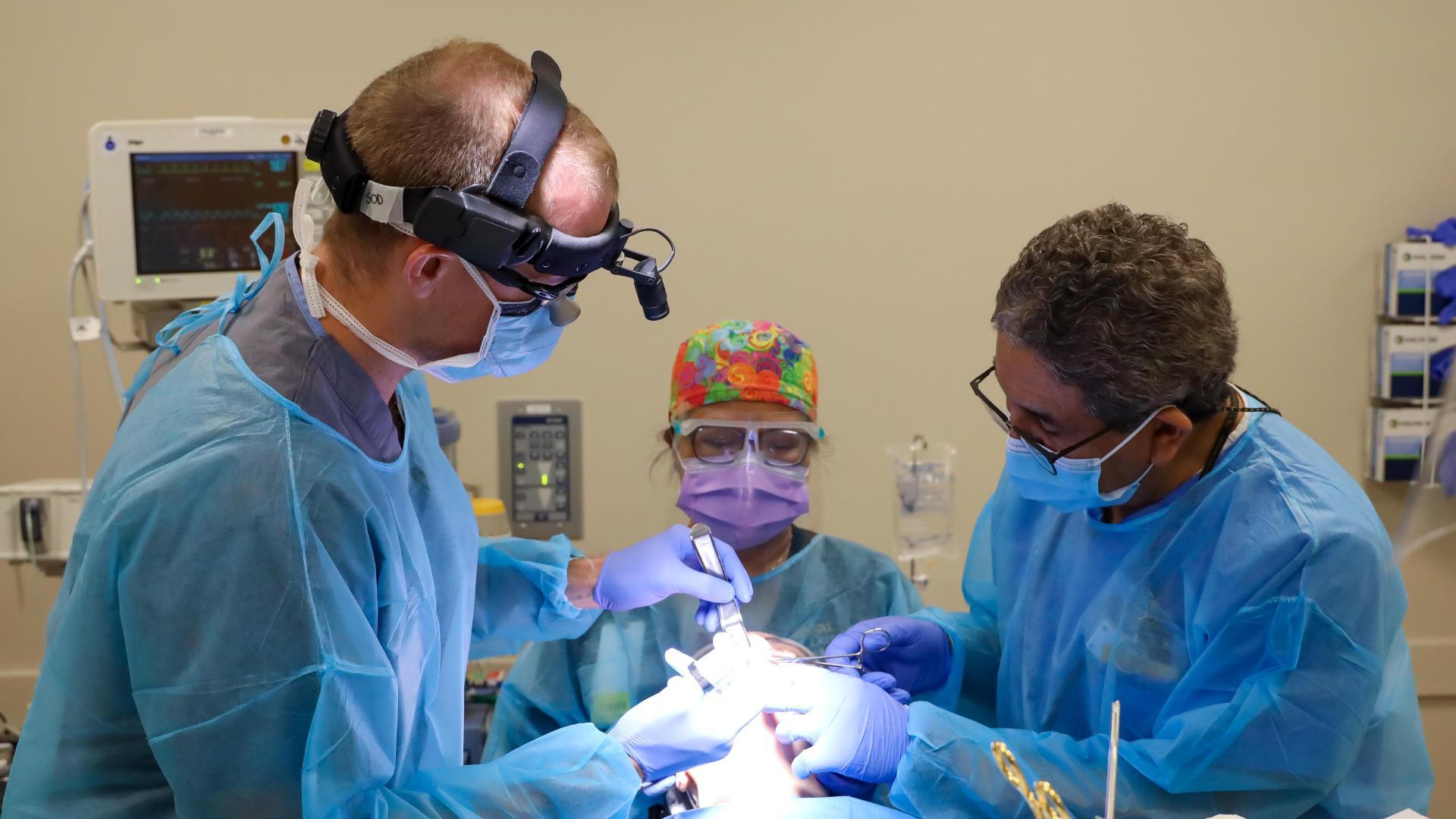Curriculum
The Department of Oral and Maxillofacial Surgery residency program has been an American Dental Association Commission on Dental Accreditation approved program since its inception more than 60 years ago. Those residents who complete the four-year curriculum (and for those who pursue the M.D. option, two additional years) fulfill all the prerequisites and requirements of the American Board of Oral and Maxillofacial Surgery and are eligible for the board’s examination.
Resident responsibility progresses in a linear tract.
The first year focuses primarily on inpatient patient care responsibilities in the pre-and postoperative periods as well as staffing the hospital outpatient minor surgery clinic. However, supervised operating experience is encouraged commensurate with the complexity of the case and the abilities of the individual resident. In addition, rotations in medicine and surgery, as described below, enhance the resident’s medical background.
First-year curriculum and responsibilities
- Physical Diagnosis, eight weeks
- Oral and Maxillofacial Surgery Hospital Clinic, six months
- General Surgery, one month
- Surgical Oncology, one month
- Trauma Surgery, one month
- Pediatric General Surgery, one month
- Internal Medicine, one month
- Emergency Medicine, one month
The second year is similar to the first, with the addition of several clinical rotations structured to allow relative autonomy under direct supervision of faculty surgeons. Additional advanced medical rotations are also performed during this year.
Second-year curriculum and responsibilities
- Oral and Maxillofacial Surgery Service (Hospital, O.R., or School Clinic), six months
- Anesthesia, five months
- Cardiology, one month
- Surgical ICU, one month
The third year increases participation and responsibility in patient management, and specifically in the operating room. The residents assist on cases done with the chief residents as a team under supervision of the attending staff. They also assume responsibility for the day-to-day consultative and administrative details of the service.
Third-year curriculum and responsibilities
- Oral and Maxillofacial Surgery Hospital Operating Room, four months
- Private Service at local hospitals with outstanding local surgeons or in the faculty practice at VCU/MCV, four months
- Oral and Maxillofacial Surgery Hospital or School Clinic, four months
The fourth year, or chief resident, assumes total responsibility for the organization and operation of the service. In concert with the faculty surgeons, the chief resident makes decisions on patient care and takes charge of executing treatment plans. The fourth-year resident has a major role in the teaching of residents and students who rotate on the service.
During the fourth year, the chief residents, along with the program director, are responsible for the day-to-day oversight of the resident staff and coordination of the academic program. In addition, they staff all major operating room cases and are the primary participants in cosmetic facial surgery and implant clinics. The chief residents are also encouraged and funded to attend at least two conferences per year, one of which is the AAOMS annual meeting.
The Department of Oral and Maxillofacial Surgery offers an M.D. degree option. Those residents interested in this option may enter medical school upon satisfactorily completing the four-year program and meeting the admission criteria for advanced standing. The candidate completes the second and third years of medical school and is then awarded the M.D. degree. For more information on our program, our city and our M.D. option please visit the VCU School of Medicine’s graduate medical education.
Formal teaching rounds are carried out each morning under the guidance of the faculty. Less formal working rounds are held each afternoon under the leadership of the chief resident. Faculty are consulted formally and informally by all levels of trainees involved in patient care. Each patient is admitted to the care of a full-time faculty member who works with the fourth-year resident in planning and implementation of the patient’s treatment.
Resident education in the basic biomedical sciences is enhanced in three ways. First, weekly departmental conferences are designed to cover a broad spectrum of oral and maxillofacial surgical and medical topics, with basic sciences presented as an integral part of the background, diagnosis and treatment. Second, each resident takes part in an oral mock board examination administered yearly by non-faculty surgeons. Third, each resident takes the yearly OMSITE (Oral and Maxillofacial Surgery in Training Examination) of the American Association of Oral and Maxillofacial Surgeons. These examinations encourage study in the basic sciences as well as clinical areas.
All residents, in conjunction with a faculty preceptor, design and perform a research project, write a textbook chapter, or involve themselves in some other form of scholarly activity. The project should produce a publishable manuscript prior to completion of the program. If the abstract of the research is chosen for presentation by the IADR or AAOMS, the department pays the expenses incurred by the resident to present the abstract. The following list specifies the rotations for each postgraduate year.
The team system
We have three service teams: an operating room team, a hospital (clinic, emergency room, consults, etc.) team, and a school/practice team. Each team is comprised of a fourth-year reaident, a third-year resident and a lower-level resident.
